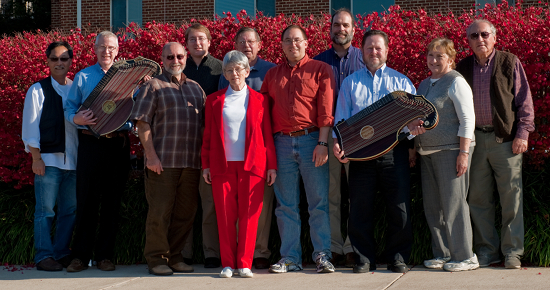
With this seminar, held on 22-23 October 2010 in Springfield VA, we round out three dozen zither seminars – eighteen years’ worth of semi-annual zither meetings. All eleven of the participants were veterans of past Sterling Zither Seminars, and we look forward to many more hours of playing together and adding to our group.
The open playing on Friday afternoon was lively and also included some time on the pieces scheduled for Saturday.
Despite the long distances to be traveled, everyone was ready and raring to go at nine o’clock Saturday morning, and we got off to a classical start with two anonymous 16th-century dances arranged for two zithers by Peter Suitner: Les Buffons and Galliarde. Less is often more in Renaissance music, as it is in these two delightful pieces. There are fewer notes to be played, but when each one is heard clearly and in the correct – often syncopated – timing, the effect is clear and refreshing.

In contrast to this spare style, we moved along to Die beiden kleinen Finken, one of Henry Kling’s best fun-pieces. This duet was a favorite of Rudi Knabl’s, and it’s not for the faint of heart to attempt it. The right hand keeps mostly to variants of the bass-plus-chord pattern, but the switches between 6/8 and 4/4 tempo, the key changes, and the occasional passages of 4-tone chords require concentration. And against this accompaniment there is much going on in the left hand: runs, triplets, arpeggios, also requiring concentration as well as good fingering and fluency. We had a wonderful time with this piece and will do it again soon.
Relaxing from the demands of the birdies’ activity and dialog, we sought out the high mountains of Italy and La Montanara, Toni Ortelli’s haunting popular song in an easy duet arrangement by Jane Curtis. Smoothness and a relaxed tempo make this dreamy song a pleasure to play and a pleasure to hear.
Many seminars ago we played Josef Hauser’s duet Die Zithermeisterin, and we returned to it now, edited and with an added third voice by Jane Curtis. This is a graceful piece, full of spirit, not really difficult to play but offering interesting and attractive features such as grace notes, hammer-ons, harmonics, and a nice flamboyant olde tyme finish.
The last of the seminar pieces was Willi Schäffler’s trio arrangement of Vier Kontratänze aus der Steiermark. We played them in the order 1-2-4-3, going from the perky march with its striding Bass-Begleit in the right hand, through the sudden change to a halt-step rhythm in 3/8 time, continuing into the laid-back “Ruhig” movement, and ending with the very lively “Lustig” and its flowing interplay among the three voices.
Our spring seminar will take place 8 and 9 April 2011. For more information, contact Jane Curtis at zitherlady@yahoo.com.


